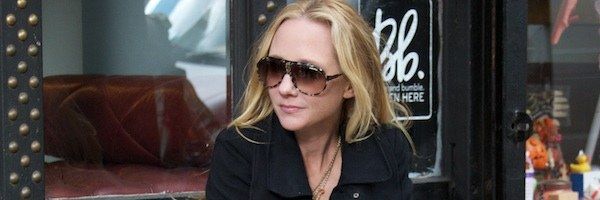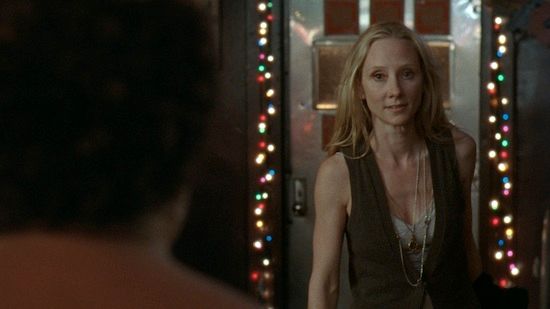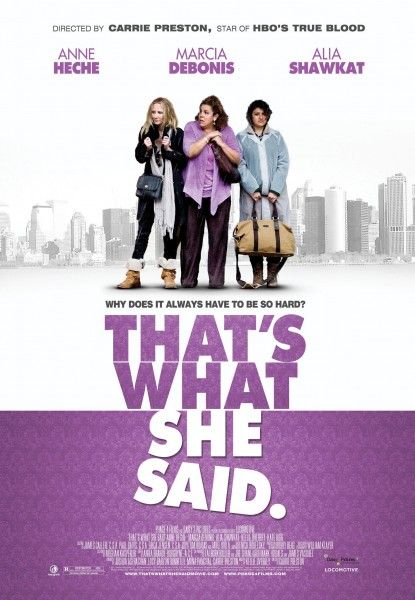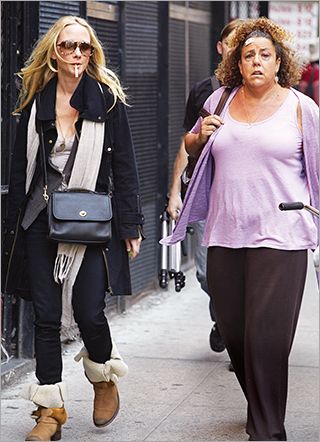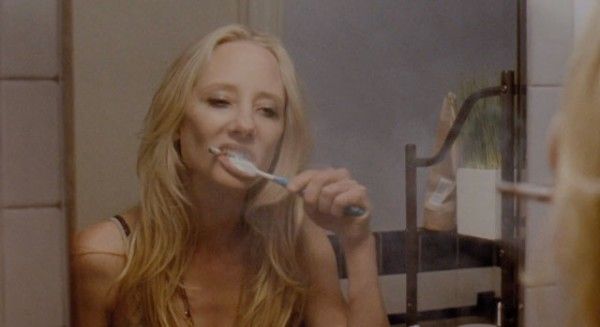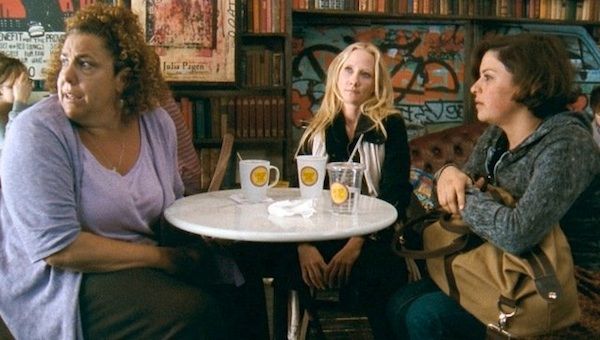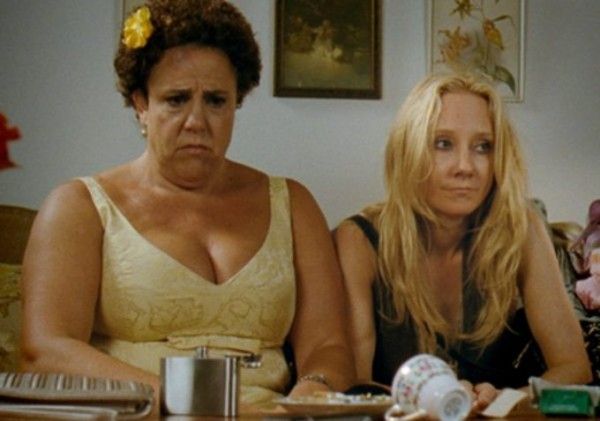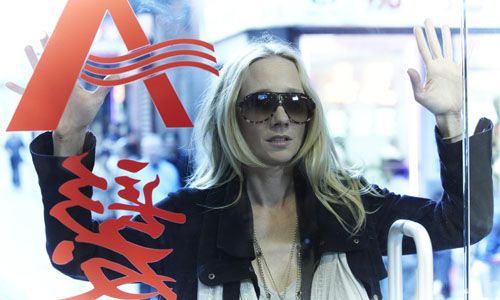Anne Heche stars in That’s What She Said, a quirky and honest look at friendship in the face of adversity, that asks one of life’s great questions: why does it always have to be so hard? Directed by Carrie Preston from a screenplay by Kellie Overbey developed from her original play Girl Talk, the film takes a down and dirty comedic look at how friendship can survive chronic sarcasm, bizarre stranger-danger, an unexplained itch and a dangerous dildo. That’s What She Said opens in theaters on October 19th and also features Marcia DeBonis and Alia Shawkat.
At the film’s recent press day, Heche talked about her role and the challenges of making an independent film that gives audiences a hilarious and insightful glimpse into the comical realities of modern womanhood. She discussed how the cast worked to create the unique bond between characters, how her real-life escapades in New York compared to those of her character, what the directing process was like with Carrie Preston, what she enjoyed most about making the movie and the parts she could have done without, and why she thinks indie films are more willing to take risks on darker female characters.
Question: I saw this at Outfest. It was great. Everybody got a big kick out of it.
Anne Heche: Thank you so much. Excellent. I’m happy to hear that. I couldn’t make that screening but I really wanted to. I thought by all means that would have been a raucously fun screening to go to. Was it packed?
Every film was packed. It was amazing. You got a big response.
Heche: That’s great. I’m really happy to hear it. I’m glad we are relating to people. I think that’s one of the things that’s refreshing about it.
How did you work together to build those bizarre, interchangeable, but bonded relationships we see in the film?
Heche: Well, I think we all have lived in New York so we knew. There were a couple of things going on. One, it was about where you get in New York if you’re single and you haven’t found a partner or a mate, and how lonely that is, and how the city becomes an obstacle to you that’s really difficult. And then, the other is being new to the city, with Alia’s (Alia Shawkat) character being so new, and then New York becomes this beast in a way that you have to navigate and struggle with to overcome. We were all friends brought together by friends. Carrie really thinks and believes this is a film about friendship. I believe this is a movie about finding friendship even at the darkest hour and learning to have faith even when you don’t have it and learning to trust. That’s my character’s journey, I think.
But we all came together through different friends. Alec Baldwin called me and told me that we had to read this script. He and I were in Twentieth Century together with Kellie Overbey, the writer. I didn’t know that she wrote. He thought I could pull off this character. I read it on my way to New York. I called and said let me meet Carrie before I get back home after doing a Letterman appearance. I thought Alia was somebody who could play a hilarious sex addict and nymphomaniac. I had just done Cedar Rapids with Alia, so I called her on the way back to the airport. By the time I got home, she had read it and said she was in. Marcia DeBonis, of course, was in the play when it was done Off-Broadway nine years ago. We were all bonded through other friends or our own friendships. It was odd that I would know Alia, bizarre that Alec Baldwin would be telling me to read Kellie Overbey’s script. So, in that, was truth already and that’s the easiest kind of truth to then get on camera because it’s organic.
You’ve lived in New York, how different were your escapades in New York than the character that you play?
Heche: Most of my escapades were getting my Labrador dog into the back of my car to drive to Brooklyn where I worked at Avenue M Studios shooting a soap opera and battling being a 17 to 18-year-old playing twins being afraid that I was going to get fired, because who wouldn’t fire me? I had no idea what I was doing. And, I was driving back to my waitressing job on the Upper East Side that I had to back me up in case I would get canned from the show, Another World. So mine was all the triangle of my ridiculous life until finally I was late enough setting up the tables for my waitressing job. Soon, people at the restaurant were starting to recognize that I was on a soap opera, and then I would be calling the studio saying I slept through my alarm because I was working late last night, and they were like “Working doing what?” “I was closing the bar at two o’clock in the morning.” Finally, I had to quit that job. But, it was four years of a soap opera which was a soap opera. That’s what my escapades were, and also looking for love, also battling the city, but in a different way as a working young actress.
Do you think it’s easier looking for love now than it was then?
Heche: (laughs) Sure. They cast it for me. It’s perfect. That man walked into the room. Awesome! He’s cute. I love him. Let’s go there. Now I have a baby. That got much easier for me as I got older.
Playing twins on Another World and doing your waitressing job, how long did that last? All four years?
Heche: Oh no. The waitressing job went away in the first year. I was on Another World for four years.
That’s amazing that you would maintain that and have that back-up. Do you often have that Plan B just in case?
Heche: I do so many things right now. I guess I do. I’ve never seen it quite as saying I have a back-up plan, but I guess I do. It’s so funny to put it that way, but I’m always doing a bunch of different stuff and maybe that is out of… I mean, it’s no secret that my family was very, very poor, and I don’t want that for my life or my children’s life certainly. But some might say I could relax a bit more and know that that’s not going to happen to me. I’m not going to end up in a car. For better or worse, I love doing different things. Maybe my sunblock line is a back-up to my acting.
What challenged you most about your role here?
Heche: Oh, Dee Dee. Gosh, I opened the script and there was a girl there that was hung over, fell out of bed, got up, brushed her teeth while smoking a cigarette, and then I stopped. I was like “What?!” First of all, I’ve never read anything like that. I thought that’s one of the most absurd things in the world to actually describe a character that way and taking action that way, because it’s such punishment and such self-abuse and such addiction. It reads funny, so the challenge is make all that nasty stuff funny. Who is she? If this is the beginning, I can’t imagine where the script is going to go. But there’s so much self-destructiveness in that behavior that I had to go into what I felt needed to be some really dark waters of a person who had lost hope for themselves and then make that funny. That was a pretty wild beginning to a character and a story about redemption and finding faith in your friends, being true to yourself when you haven’t been, and you’ve been stuffing it for how many years Dee Dee probably hasn’t told the truth about herself, so really tough stuff that I also thought could be hilariously funny if I never faltered from that self-abuse.
I hadn’t seen the play so I thought that you developed that character from yourself. I didn’t know that that character was written into the script to begin with.
Heche: I didn’t see the play either so I didn’t know. When I did Twentieth Century, I didn’t see Carole Lombard do it either. It’s not like I wasn’t interested. I think I’m so impressionable when I’m open and being creative that I tend to not have anything come in that might [influence me] because I’ll just drink it in and become it. I wouldn’t have wanted to be influenced by that. But Dee Dee, it’s funny. What did Alec Baldwin say? “You can pull this off.” Well, what does that mean? Screw you, buddy! (Joking) Why could I pull off a drunk addict who is self-loathing? Thanks a lot! He could have called me and asked me to be his next romantic lead, but no. He said “Go get this movie made for our friends.” (Laughs) But I do take that as a genuinely huge compliment because I think Dee Dee is a very complicated woman that we don’t get to see very much because she’s not worried if people like her or not. We’re in a world where every single movie, if it has a woman in it, is usually wrapped around the woman wanting to be liked in some way, either in her life, or she’s young, she’s an ingenue, she’s a hero, she’s the lover of somebody, she’s the grandmother, she’s a chef. We always have these women that we are somehow supposed to relate to in these gorgeous, motherly, loving, sexy ways, and I just wanted to strip that all away to see what would happen. What I’m really in love with is that people are finding they relate to it. It’s like watching yourself on your worst day, and I do it worse, so you can laugh at it.
Can you talk about what the directing process was like with Carrie and what you enjoyed most about making the film and what were the parts you could have done without?
Heche: It’s always a challenge to make an independent film. It’s always a challenge to make a low budget film. So, that being said, Carrie is the reason this movie got made. She’s the champion of it. It would not exist without her belief and her stamina and her sacrifice of everything including her bank account to get it made. Working with somebody like that is inspiring and addicting. She’s a ball of fire and she’s about as skinny as a twig. It’s really funny that she’s got so much energy and life and world and presence around her. I think she would make anything happen. I’m really proud of her for fighting so hard for this movie because I think it’s going to turn her into the director she wants to be, with enough people seeing her work that she’ll be able to continue that as a career. I know she really wants to do that.
The challenges are we had to do all of our locations in between times that people don’t work in New York. All of our scenes were about ten pages long. The bar room scene at the end of the movie was probably 15 pages long, and we were working in this sticky, stanky, cranky, horrible bar that we started at 4:00 o’clock in the morning when it closed and had to end the scene by 4:00 o’clock in the afternoon when it had to open. We were rolling around literally in beer and muck and mire for about ten days and that was just one scene. The rest was the same. It was a trip. It was hard work. I remember the coffee shop was actually a pizza parlor that we were shooting in, and we came in the morning and there were stools at the pizza counter, and the owner was making the pizza sauce that they were going to serve in the joint. I mean, his business needed to continue while we were shooting, which is in and of itself hilarious. There were no chairs – no make-up chairs or hair chairs. There was no coffee spread. This didn’t exist. We showed up and it was 4:00 am, as it was every day, and there were stools with no back. We looked over and there was a tray of the leftover Dorito packs from lunch the day before for breakfast. Alia looked at me and she’s was like “Man, I told you I’d do anything for you, but this might even be pushing it.” It was a moment that was one of our lows. I’m so tired. I can’t even stand up in my chair. It doesn’t even have a back and I’m smelling garlic at 4:00 am. It was really funny, and of course, we laughed about it, and she was joking, but it was not an easy shoot. I kept saying “Have we hired the homeless to be our extras? I’m not sure if this person knows what ‘action’ means.”
After that, there was a scene where I’m supposed to be eating a sandwich, and I don’t know where the extras or background players came from. One was supposed to bump into me and my sandwich is supposed to go out of my hand. I knew that these were genuinely green actors. So, I went up to them and said “When you do a push, just leave it up to me. Basically, you can go through and brush and I’ll give it a big whirl and my sandwich will drop.” And they’re like, “Yeah, yeah.” I just see as I’m talking to them they’re getting more and more excited about this moment. We never had time to rehearse anything.
Everything that we shot was stolen on some street that we were going to get kicked off if we did another take, so I’m like “Okay. We’re ready to go. We’ve got the sandwich. We’re ready to go, guys.” I see them walking down and they’re getting into place, and I’m like good luck on this one. We hear “Action!” and I start walking, and I see this guy coming toward me, and I think he’s got a glint in his eye. He is so excited. And then, “Bam!” and I flew across the street into the one phone booth that exists in all of East New York. I’m telling you, there is one phone booth that still exists which now probably doesn’t, and my head cracked into it, and I splatted down onto the street. I’m in the alley and it’s 2:30 in the morning. Of course, I’m thinking like every actress would, “Did we get the shot? Was that funny? Do I have a concussion? Oh, I must. I must have a concussion because there’s a lot of people staring over me and trying to get me into a car to get to the hospital.” It was those moments that were happening almost dangerously every day to get this movie made. (laughs) As we talked about the struggle of it, it really is in there. We will probably never experience something that is on that level of filmmaking again in our life, I hope.
Why do you think it is that independent film is more willing to take a risk on darker female characters, whereas Hollywood likes the shiny, happy person?
Heche: Um…prettier girls make more money? (laughs) I don’t know. Independent film is taking risks in all areas. It’s not just about complicated women. I mean, the broader your audience, the more people you have to appeal to. I think it takes an introspective person to want to go into the theater and see the dark side of themselves. If it’s represented there, we look for a reflection in those people. If somebody’s willing to take a risk and walk through the door and go “Wow, some days I look like that and some days I get hung over too and some days are rough.” That takes a particular kind of person. It does not take a particular kind of person to watch me with my hair curled and my lipstick on in a pretty laced dress. If that’s easy to digest, then that’s easy to digest, and more people would like to digest that. So, both are valid. It’s just that that’s why we have so many different media outlets. Some people like to hear and not see, so we have the radio. There are so many different ways that we can get and participate in the arts. Fortunately, I’m able to get into some independent film and really rough things up a little bit, and then I’m doing Save Me on NBC, and hopefully I’ll be as lovable and accessible as I can possibly be so everyone can giggle with me that way, too.
You’re someone who has always been very socially conscious. There have been some big fundraisers here in L.A. when President Obama was here recently. Have you had an opportunity to go to any of them?
Heche: I didn’t. I was actually at another fundraiser which I care equally about and I would say more so. I was at SickKids in Toronto when that happened and I do a fundraiser for the SickKids Hospital (The Hospital for Sick Children aka SickKids, affiliated with the University of Toronto). That was my choice of fundraising activity. James (husband James Tupper) and I go and support the hospital, and I wanted to take Homer this year so that he would have an opportunity to talk to the kids. After we came home last year, he was really moved, and I would say confused, about what that means to have a hospital where everyone in it is a child and everyone is sick. So, we committed to take him there this year. And, I have given money to the Obama campaign online and now they bombard me with emails every day. Why did I do that online? Why didn’t I just walk into an office?
As an actor, what do you think happened on the first debate?
Heche: Oh God, I’m not going to get into that. That’s probably the most boring conversation you could hear – an actor talk about politics. I won’t go there. I won’t do that to you.
What’s your sunblock that you mentioned earlier?
Heche: Tickle Time Sunblock for Kids, the first 100% mineral, 100% natural powdered sunblock.
What made you decide to do that?
Heche: Kids hate putting on sunblock and it’s really awful for their eyes and their skin, so I wanted to make something fun because every kid has to put on sunblock every day.
Does Homer put it on?
Heche: Heck, yeah. So does Attie. Attie’s like “I’ve got this one, mom. I know. Tickle Time.” It’s fun because it comes with a brush and it’s powdered so they tickle themselves and they giggle and it’s a much easier way to start your day and it’s takes a twentieth of the time that regular sunblock does. It’s micronized minerals.
So that was your goal going into it?
Heche: Yes. You can find Tickle Time on Sunblock.com, but also today, because we’re a brand new product, we’re on fab.com and you can get it $10 off.
That’s What She Said opens in theaters October 19th.

